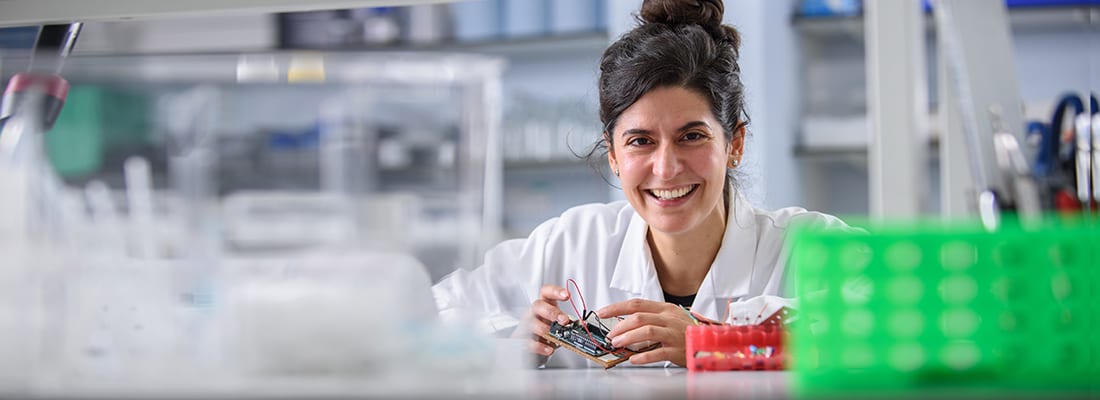 Biologist Sara Correia Carreira plans to build robotic skin, conducting research into the combination of robotics with bioengineering – just one of the ground-breaking projects being investigated by the first cohort of Vice-Chancellor’s Fellows. These Fellowships highlight the spirit of innovation and collaboration that is taking us into the future.
Biologist Sara Correia Carreira plans to build robotic skin, conducting research into the combination of robotics with bioengineering – just one of the ground-breaking projects being investigated by the first cohort of Vice-Chancellor’s Fellows. These Fellowships highlight the spirit of innovation and collaboration that is taking us into the future.
As a child I remember being fascinated by the robotic hand of Luke Skywalker in Star Wars: The Empire Strikes Back, and what he could do with it. Interfacing living tissues with non-living replacement parts seemed a tremendously exciting idea! But I never thought that today, as a biologist, I would get to work with an amazing robotics team in the realm of healthcare. I never imagined that human biology could work so closely with an area of engineering as complex and interesting as robotics.
As part of my research programme I am working on a way to engineer a living and moving robotic skin. Skin is something I became interested in very recently, while working on antimicrobial sprays and creams that can be topically applied to prevent infection of wounds. Through my work I discovered that it was impossible to test how well these creams and sprays would perform on the skin of an actual living, moving human – for example, would they slide off as the skin moves around? Would they penetrate properly as the body went through its natural motions? We cannot know, as there is simply no laboratory model of moving skin – the current models are flat and static, with skin grown as a sheet on a rigid plastic membrane.
My research aims to find a way to apply those mechanical stresses to engineered skin. Apart from making it a far more realistic model of skin, it could also improve the mechanical properties of the bioengineered tissue, so that it more closely matches the characteristics of real skin.
How am I going to make this work? Robotic skin! I plan to replace the rigid membrane with something stretchy, using soft robotics, to mimic the muscles that would be underneath real skin. The ability to bioengineer the skin exists and Bristol is making incredible progress with soft robotics. I will be collaborating with colleagues to create both. Then the biggest challenge of all will be finding a way of attaching the skin to the robotics underneath, which is what has never been done before.
Initially the robotic skin will be used to investigate whether the movement of medication across this model is different from the current static models. But it could improve people’s lives in other ways, for example burns patients who need skin grafts. With robotic skin we could test it under more lifelike conditions, making it less likely to rupture when grafted onto the patient.
To even attempt what I want to do I needed certain conditions in place – which Bristol readily fulfils. This project requires: an institution with a reputation for research excellence; world-renowned robotics and bioengineering facilities; and a willingness across faculties to work in an interdisciplinary and collaborative way. I will be working with some incredible colleagues here in different departments to make this project a reality.
When the call for applications to the new Vice-Chancellor’s Fellowships went out, I jumped at the chance to apply. My experience at Bristol doing both my PhD and my postdoctoral research had demonstrated very clearly what a unique collaborative experience could be had at this University. I did my first degree in Biology in Germany, where I’m from, and afterwards I was unsure if I wanted to continue with academia. My time at Bristol has shown me what wonderful opportunities are being afforded here, to researchers like myself who are excited about the advancements we can make for humanity. The research that I and other scientists are working on right now is uncharted territory. I’m grateful that Bristol is giving me the opportunity to do this research and make a real-world impact on healthcare.
Further information
The University’s first cohort of 12 Vice-Chancellor’s Fellows started in the academic year 2017-18 with one Fellow fully supported by philanthropy. Alumni funding for a further four Fellows for 2018-19 has been secured, to bolster the cohort of 14 funded by the University.
For more information about the Fellows see bristol.ac.uk/vc-fellows.
You can listen and download the audio version here (mp3).


